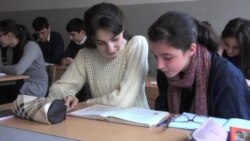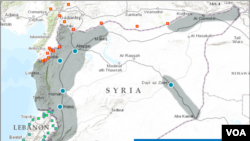YEREVAN, ARMENIA —
As Syria’s civil war marks a two-year anniversary on March 15, the human cost will be more than 70,000 dead, one million refugees outside the country, and two million more people forced to find new shelter inside Syria.
One trickle of refugees has been a flow of 6,000 Armenian Christians, going north to a landlocked, mountainous country many never knew: their ancestral homeland of Armenia.
Many Armenians say they have been well treated by Syrians, the people who gave shelter to their forefathers nearly one century ago, after they fled massacres by Ottoman Turks.
In recent years, though, Armenians have watched Christians retreat from Lebanon, Iran, and Iraq. The Syrian Armenians’ quiet departure reflects their doubt that a tolerant, secular state will emerge from Syria’s civil war.
Living in Armenia, thinking of Syria
At Yerevan’s High School No. 114, about 150 Syrian Armenian students are now enrolled in classes.
Last summer, many students left Aleppo, the homeland of Syria’s Armenian community, for what they thought would be a two-week vacation in Armenia. Now, they try to keep up with friends back home using Skype and Facebook.
"I can’t talk with them," Maria Vartanian, aged 15, said of girlfriends back home. "Because when I talk with them, I will cry. I can’t."
Garen Balkhian, a 17-year-old senior, said many of his old friends from Aleppo have scattered. "A couple of my friends are here in Armenia - this school," he said. "And a couple of them went to Canada. And I know one friend who went to the [United] States."
Across town, Sarkis Balkhian helps run an aid project designed to help Syrian Armenians find apartments, schools and jobs in Yerevan. A Syrian-Armenian himself, Balkhian went to college in the United States, and then moved to Armenia.
"When the conflict initially started in July, a lot of Syrian Armenians believed that it would last only for a couple of weeks," he said, in an office room stocked with blankets and warm sweatshirts. "So a lot of Syrian Armenians moved to Armenia with summer clothes and they didn’t bring with them winter clothes. A lot of people didn’t bring enough finances to sustain themselves in the long run."
At Yerevan’s Anteb restaurant, Sarkis Rshdouni, a foreign currency trader, said that many fellow Syrian Armenians have had a hard time getting good jobs in Armenia, a small, isolated country with high unemployment.
1915 massacre still casts a shadow
Like many, Rshdouni worries about the fate of Christians if Muslim radicals take power in Syria.
"The Christians, let’s say, don’t trust the politics of each country they live in, but they trust the Arabs, the regular Arabs - the citizens," he said. "They don’t feel stable. The countries that they’re living in, in the Middle East, it’s not stable."
Driving Armenian insecurity is the collective memory of the 1915 genocide. Almost one century ago, Ottoman Turks killed 1.5 million Armenians in Turkey - about three-quarters of the local population. For VIP visitors to Yerevan, it is obligatory to visit the capital’s hilltop Armenian Genocide Museum and Institute.
One legacy of the genocide, said Richard Giragosian, a think tank director, is that Armenians in the Middle East are a people primed to get up and go. After Gamal Abdel Nasser rose to power in Egypt in 1952, Armenians felt threatened by his socialist policies.
"Then they left," said Giragosian, who directs the Regional Studies Center here. "Then it was Beirut, then the [Lebanese] civil war. Then it was Tehran. They left in 1979 in large numbers. So there is a natural dynamic trend for change in what is called the Armenian diaspora. So the Armenian position in the Middle East has never been static or stable."
For the young Syrian Armenians, a new generation of Armenia’s diaspora, their passport to the future is flexibility. In the halls of School No. 114, they talk of going to college in America, of going home to Aleppo - or of making their future here in Armenia.
One trickle of refugees has been a flow of 6,000 Armenian Christians, going north to a landlocked, mountainous country many never knew: their ancestral homeland of Armenia.
Many Armenians say they have been well treated by Syrians, the people who gave shelter to their forefathers nearly one century ago, after they fled massacres by Ottoman Turks.
In recent years, though, Armenians have watched Christians retreat from Lebanon, Iran, and Iraq. The Syrian Armenians’ quiet departure reflects their doubt that a tolerant, secular state will emerge from Syria’s civil war.
Living in Armenia, thinking of Syria
At Yerevan’s High School No. 114, about 150 Syrian Armenian students are now enrolled in classes.
Last summer, many students left Aleppo, the homeland of Syria’s Armenian community, for what they thought would be a two-week vacation in Armenia. Now, they try to keep up with friends back home using Skype and Facebook.
"I can’t talk with them," Maria Vartanian, aged 15, said of girlfriends back home. "Because when I talk with them, I will cry. I can’t."
Garen Balkhian, a 17-year-old senior, said many of his old friends from Aleppo have scattered. "A couple of my friends are here in Armenia - this school," he said. "And a couple of them went to Canada. And I know one friend who went to the [United] States."
Across town, Sarkis Balkhian helps run an aid project designed to help Syrian Armenians find apartments, schools and jobs in Yerevan. A Syrian-Armenian himself, Balkhian went to college in the United States, and then moved to Armenia.
"When the conflict initially started in July, a lot of Syrian Armenians believed that it would last only for a couple of weeks," he said, in an office room stocked with blankets and warm sweatshirts. "So a lot of Syrian Armenians moved to Armenia with summer clothes and they didn’t bring with them winter clothes. A lot of people didn’t bring enough finances to sustain themselves in the long run."
At Yerevan’s Anteb restaurant, Sarkis Rshdouni, a foreign currency trader, said that many fellow Syrian Armenians have had a hard time getting good jobs in Armenia, a small, isolated country with high unemployment.
1915 massacre still casts a shadow
Like many, Rshdouni worries about the fate of Christians if Muslim radicals take power in Syria.
"The Christians, let’s say, don’t trust the politics of each country they live in, but they trust the Arabs, the regular Arabs - the citizens," he said. "They don’t feel stable. The countries that they’re living in, in the Middle East, it’s not stable."
Driving Armenian insecurity is the collective memory of the 1915 genocide. Almost one century ago, Ottoman Turks killed 1.5 million Armenians in Turkey - about three-quarters of the local population. For VIP visitors to Yerevan, it is obligatory to visit the capital’s hilltop Armenian Genocide Museum and Institute.
One legacy of the genocide, said Richard Giragosian, a think tank director, is that Armenians in the Middle East are a people primed to get up and go. After Gamal Abdel Nasser rose to power in Egypt in 1952, Armenians felt threatened by his socialist policies.
"Then they left," said Giragosian, who directs the Regional Studies Center here. "Then it was Beirut, then the [Lebanese] civil war. Then it was Tehran. They left in 1979 in large numbers. So there is a natural dynamic trend for change in what is called the Armenian diaspora. So the Armenian position in the Middle East has never been static or stable."
For the young Syrian Armenians, a new generation of Armenia’s diaspora, their passport to the future is flexibility. In the halls of School No. 114, they talk of going to college in America, of going home to Aleppo - or of making their future here in Armenia.













